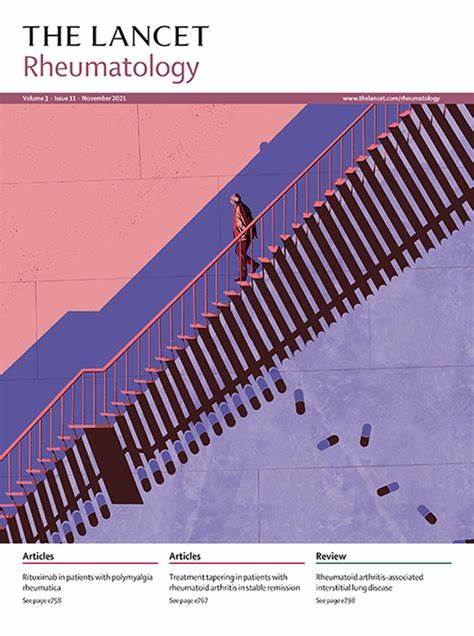VEXAS syndrome and immune-mediated rheumatic diseases: overlaps in clinical features and mechanisms
IF 16.4
1区 医学
Q1 RHEUMATOLOGY
引用次数: 0
Abstract
Vacuoles, E1 enzyme, X-linked, autoinflammatory, and somatic (VEXAS) syndrome is a newly identified disorder caused by an acquired monogenic somatic UBA1 gene mutation, affecting nuclear and cytoplasmic ubiquitination. This mutation triggers immune dysregulation, leading to diverse clinical and pathological features resembling inflammatory rheumatic diseases. Blood abnormalities stem from myeloid precursor dysfunction, presenting as elevated concentrations of inflammatory markers and cytokines, leukopenia, and macrocytosis. These abnormalities can lead to inflammatory arthritis, vasculitis, polychondritis, thrombosis, and connective tissue disease-like syndromes. This Review explores the clinical and mechanistic links between VEXAS syndrome and rheumatic diseases, offering guidance on current best management strategies. Although rare, VEXAS syndrome has high morbidity and mortality, providing valuable insights into how genetic mutations drive immune system activation and rheumatic disease development.
风湿性关节炎综合征与免疫介导的风湿病:临床特征和机制的重叠
空泡、E1酶、x连锁、自身炎症和躯体(VEXAS)综合征是一种新发现的疾病,由获得性单基因体细胞UBA1基因突变引起,影响细胞核和细胞质泛素化。这种突变引发免疫失调,导致类似炎症性风湿病的多种临床和病理特征。血液异常源于骨髓前体功能障碍,表现为炎症标志物和细胞因子浓度升高、白细胞减少和巨噬细胞增多。这些异常可导致炎症性关节炎、血管炎、多软骨炎、血栓形成和结缔组织病样综合征。本综述探讨了风湿性关节炎综合征与风湿病之间的临床和机制联系,为当前的最佳治疗策略提供指导。虽然罕见,但VEXAS综合征具有高发病率和死亡率,为基因突变如何驱动免疫系统激活和风湿病的发展提供了有价值的见解。
本文章由计算机程序翻译,如有差异,请以英文原文为准。
求助全文
约1分钟内获得全文
求助全文
来源期刊

Lancet Rheumatology
RHEUMATOLOGY-
CiteScore
34.70
自引率
3.10%
发文量
279
期刊介绍:
The Lancet Rheumatology, an independent journal, is dedicated to publishing content relevant to rheumatology specialists worldwide. It focuses on studies that advance clinical practice, challenge existing norms, and advocate for changes in health policy. The journal covers clinical research, particularly clinical trials, expert reviews, and thought-provoking commentary on the diagnosis, classification, management, and prevention of rheumatic diseases, including arthritis, musculoskeletal disorders, connective tissue diseases, and immune system disorders. Additionally, it publishes high-quality translational studies supported by robust clinical data, prioritizing those that identify potential new therapeutic targets, advance precision medicine efforts, or directly contribute to future clinical trials.
With its strong clinical orientation, The Lancet Rheumatology serves as an independent voice for the rheumatology community, advocating strongly for the enhancement of patients' lives affected by rheumatic diseases worldwide.
 求助内容:
求助内容: 应助结果提醒方式:
应助结果提醒方式:


